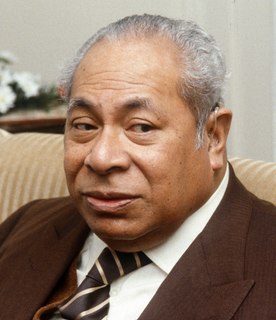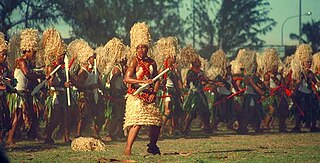Related Research Articles

Nukuʻalofa is the capital of Tonga. It is located on the north coast of the island of Tongatapu, in the country's southernmost island group.
Music of Tonga refers to music derived from the island Tonga in the islands of Polynesia. Music of Tonga today generally falls under the category of traditional music that has withstood the test of time, or into one of the two opposing genres of religious and secular music. Tongan music can be either very emotional and somewhat modern with instrumental makeup including modern brass instruments, or conversely can be very primitive and consist of only drums and voices. In this way, Tongan music is very diverse despite the fact that it is contained to a fairly small island, which means that the different cultures and styles co-exist on the small land mass together without blending.

Tāufaʻāhau Tupou IV, son of Queen Sālote Tupou III and her consort Prince Viliami Tungī Mailefihi, was the king of Tonga from the death of his mother in 1965 until his own death in 2006.

The Tongan archipelago has been inhabited for perhaps 3000 years, since settlement in late Lapita times. The culture of its inhabitants has surely changed greatly over this long time period. Before the arrival of European explorers in the late 17th and early 18th centuries, the Tongans were in frequent contact with their nearest Oceanic neighbors, Fiji and Samoa. In the 19th century, with the arrival of Western traders and missionaries, Tongan culture changed dramatically. Some old beliefs and habits were thrown away and others adopted. Some accommodations made in the 19th century and early 20th century are now being challenged by changing Western civilization. Hence Tongan culture is far from a unified or monolithic affair, and Tongans themselves may differ strongly as to what it is "Tongan" to do, or not do.
Rev. Dr Alfred Harold Wood OBE was a 20th-century Australian Christian minister, educator, writer, hymnologist and advocate of church union.

George Brown was an English Methodist missionary and ethnographer.

The Methodist Church of Fiji and Rotuma is the largest Christian denomination in Fiji, with 36.2 percent of the total population at the 1996 census. Of the 280,628 persons identifying themselves as Methodists, 261,972 were indigenous Fijians, 5,432 were Indo-Fijians, and 13,224 were from other ethnic communities.
Viliame (William) Vuetasau (c.1820-1857) was a Fijian explorer who was the son of Roko Malani, the seventh Roko Sau of Lau and second Tui Nayau and Ciri of Taqalevu. During the reign of his Uncle Taliai Tupou, third Tui Nayau, he was considered heir to the title. He was the first of his noble line to be given a western name, William, after Willam Cary, survivor of the Nantucket whaling ship Oeno that was wrecked in the Lau Islands in 1825. William Cary was rescued by a brother of Malani, who in time became close friends with Malani himself, who named his son after the New Englander, demonstrating his attachment to the shipwrecked sailor.
Roko Taliai Tupou (17??-1875) was a Fijian nobleman. He is considered to be the progenitor of the noble household Vatuwaqa in the chiefly Vuanirewa clan and as such, was the first member of this noble household to hold the title Tui Nayau. His reign marked the growth of Christianity in Lau and the slow expansion of Tongan ambitions in Fiji, led by Enele Ma'afu. As this period marked increasing contact with Europeans, records from this point forward in regard to the history of Lau are well documented.
The South Pacific Division (SPD) of Seventh-day Adventists is a sub-entity of the General Conference of Seventh-day Adventists, which oversees the Church's work in the South Pacific nations of Australia, New Zealand, Papua New Guinea and the islands of the South Pacific. Its headquarters is in Wahroonga, Australia.
Aleamotuʻa was the 18th Tu'i Kanokupolu of Tonga, the third lineage of Tongan Kings with the political and military power who ruled in support of the Tu'i Tonga.

The Seventh-day Adventist Church in Tonga, is one of the smaller religious groups in the South Pacific island state of Tonga with over 3,599 members as of June 30, 2018, started by Seventh-day Adventist missionaries from the United States who visited in 1891 and settled in 1895. They set up schools but made very little progress in conversion, handicapped by dietary rules that prohibited popular local foods such as pork and shellfish, and that also banned tobacco, alcohol and kava.

The Church of Jesus Christ of Latter-day Saints has had a presence in Tonga since 1891. The Tongan Mission was organized in 1916. However, due to anti-Mormon rumors and government policies, the LDS Church did not grow steadily in Tonga until 1924. Between 1946 and 1956, church leaders published Tongan translations of the scriptures and built a church-sponsored school known as the Liahona School. In 1968, Tonga's first LDS stake was organized and the Nuku'alofa Tonga Temple was dedicated in 1983.

Sioeli Nau also known as Joel Nau was a Tongan Methodist minister. He was the son of Lu'isa Ma'ukakalafo'ou Lauaki and Filipe 'Onevela. He was also the grandson of Matapule Lauaki the Nima Tapu.
Aminio Baledrokadroka was the charismatic leader of Fiji's Methodist (Wesleyan) missionary band to New Britain Island, Papua New Guinea in the latter part of the nineteenth century. He displayed excellent qualities of leadership in adversity and paved the way for later generations of native Fijian missionaries in spreading Christianity to other parts of Papua New Guinea and the Solomon Islands.
Joeli Bulu became a Christian in 1833. He was one of a band of Tongan teachers who came to Fiji in 1838, and pioneered the work of the Christian Church in this group. He served the Church in Fiji for almost four decades. Many others were great in the same way. Paula Vea, another dynamic Christian missionary was a contemporary of his.
Lelean Memorial School is one of the largest co-ed schools in Fiji. It was established in 1943 and is run by the Methodist Church of Fiji and Rotuma. It is co-located at the Davuilevu Methodist Compound with the Davuilevu Theological College and the Young People's Department, which runs training for Methodist catechists.

Dr Elizabeth Wood-Ellem was a Tongan-born Australian historian actively engaged in the life of Tonga and author of the definitive biography of Queen Sālote Tupou III of Tonga.

Viwa Island, Yasawa is located approximately 70 km northwest of Denarau situated in the Yasawa Islands of Fiji.

Mary Ann Lyth was a British missionary, translator, and teacher. She traveled to several countries with her husband, Rev. R. B. Lyth, M.D., the first Medical Missionary sent out by the Wesleyan Methodist Missionary Society, London. She provided basic European-style education at her various stations, and helped her husband as a nurse. She also assisted in the translation of the Bible, and other literary work.
References
- John Garrett,“To Live Among the Stars”, Institute of Pacific Studies, 1985 (book reviewed in the Journal of Pacific History, Sept, 1998, by Roderic Lacey)
- Tippett, A.R., 1954, The Christian (Fiji 1835–1867), Auckland Institute and Museum, Auckland
- BALEIWAQA, Tevita, 1996, ‘Josua Mateinaniu/Ko Josua Mateinaniu’, in Thornley and Vulaono 1996:20–30.
- Memoirs of Mrs Margaret Cargill : wife of the Rev. David Cargill, A.M., Wesleyan missionary, including notices of the progress of Christianity in Tonga and Feejee / by her husband
| This article about a member of the Christian clergy is a stub. You can help Wikipedia by expanding it. |
| This biography of a Fijian is a stub. You can help Wikipedia by expanding it. |